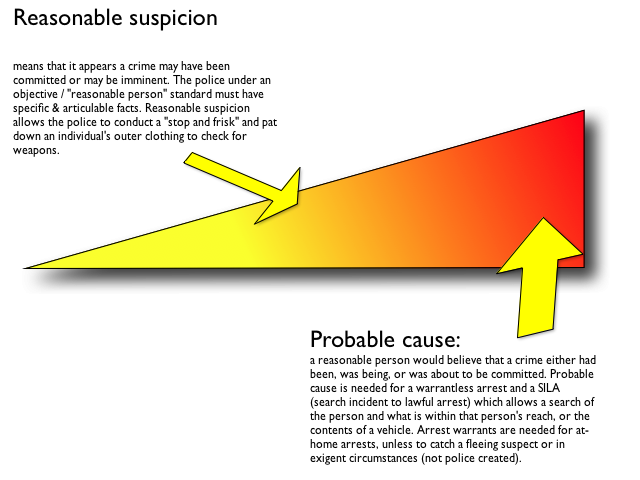Difference between Reasonable Suspicion and Probable Cause

There are a number of differences between reasonable suspicion and probable cause. A police officer can not arrest a suspect merely based on reasonable suspicion. A probable cause is needed for a suspect to be arrested. However, a person can be stopped and questioned on the basis of reasonable suspicion alone.
It is a law in almost all civilised countries around the globe that before a suspect can be arrested or searched; law enforcement officials must obtain an arrest or search warrant from a criminal court. In order to do this, law enforcement official must show a probable cause to the court, based on which the court may or may not issue a warrant. On the other hand, in situations where a person is suspected of carrying weapons illegally, reasonable suspicion is good enough for a police officer to search the suspect. The same holds true in situations involving imminent danger of bodily harm.
Consider the literal meaning of the terms ‘Probable Cause’ and ‘Reasonable Suspicion’, one can safely come to the conclusion that probable cause directly relates to a situation where concrete evidence pointing to a committed crime is present. Reasonable suspicion on the other hand, is a term used in order to justify investigation based on mere belief that the person being investigated was directly or indirectly involved in a crime.
Categorically, reasonable suspicion is more of a hunch whereas probable cause is relatively more concrete and is totally based on facts instead. For this reason, arresting a person requires probable cause instead of reasonable suspicion.
Instructions
-
1
Probable Cause:
Probable cause is the belief of a law enforcement official based on logic and supported by facts and circumstances, that a particular person was directly or indirectly involved in a crime being investigated by the law enforcement official.
Image Courtesy: theurbanpolitico.com

-
2
Reasonable Suspicion:
Also referred to as reasonable presumption, reasonable suspicion is the belief of a law enforcement official that a particular crime has already occurred or is bound to occur at some point in time in the near future. Rational conclusion derived from facts and circumstances provide bases for reasonable suspicion or reasonable presumption. Reasonable suspicion is more of a hunch and does not mean as much as probable cause.
Image Courtesy: citelighter.com








